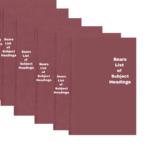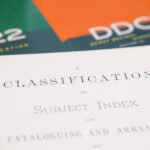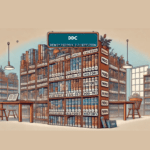Definition of book selection Book selection is the process of evaluating each book to decide which books should be added to a collection. So library collection is only worthwhile if it is properly developed and meets the needs of the readers. For fair selection, the selection is made by evaluating the fault-two judgments. The reader needs to change over time. Therefore, the type of content readers need is verified through various processes. Such as formulating their own list knowing their recommendations, opinion polls, keeping in touch with equivalent libraries, checking their collections, and keeping abreast of new publications. Melville Dewey said, “The best book at the lowest price should be selected for the largest public”. In 1876, the American Library Association adopted this as the standard motto for book selection. Francis Drury said in his Book Selection, “In book selection, books of the best quality at the lowest possible price should be selected for the greatest number of readers.”. He said about the importance of book selection: “The ultimate aim of book selection is to provide the right book, to the right reader, at the right time. According to Ralph Owling – “Book selection and reader guidance are at the top of the library profession, the library is nothing more than a supporting function.

Different theories about book selection in the Past
There is no doubt that the library’s selection of books is highly dependent on the needs and requirements of the reader. The main function of the library is to assess the needs and to meet them. It is not a very easy task. A lot of research has been done by book scientists, and research is continuing on this subject, which has to be selected depending on the needs and requirements that are always changing. Various rules of book selection are mentioned according to scientists’ research. Edward Evans, in his book “Developing Library Collections” has expressed the various views of famous library scientists on book selection, summarized as follows:
1. Melville Dewey:
Melvil Dewey defined book selection in 1876 as “the selection of the best books, at the lowest price, for the largest group”. The American Library Association honored this quote as a book selection. Helen-E. Haines, in support of Dewey, argues that the doctrine of religious discourse is special in the literary world. That is, the best book at the lowest price—for the greatest number of readers—this is a maxim that should always be remembered. Dewey attached great importance to book selection. According to him, the librarians in every library should carry out the book selection process very efficiently. The tasks to be done are selection of quality books, reader satisfaction and bringing books to the attention of informed readers with administrative skills.
2. L.R.McColvin:
In 1925, L.R.McColvin expressed the opinion that in the selection of books, the needs of the public should be given importance, especially in the case of public libraries. Responsibilities and duties of libraries, to identify needs, measure them and meet them. According to him, the collection should be in proportion to the demand in a particular subject. In addition, McColvin said the information in the book must be accurate. Differentiate between facts and opinions on the subject. The information should be up-to-date, and above all, the presentation of the content, its use of the book and the writing style of the author should be sound.
3. Francis Drury
In 1939, Francis Drury said of book selection, “At the lowest possible price, the best books should be selected for the greatest number of people. Drury’s and Dewey’s recommendations play a key role in book selection. That is, with extensive knowledge of the book world, and reader needs, there should be a knowledgeable and efficient administrative system so that after the selection of the book, the book is transferred to the shelf in an orderly manner, hence, they are called complementary.
4. Harold V. Bonny
In 1939, Harold V. Bonny, in his book “A Manual and Practical Book Selection for Public Libraries” has expressed some practical and well-thought-out theories on book selection. Although his recommendations are specific to public libraries, in many cases they can be applied to other types of receiving libraries. According to Bonny, public libraries need to know the tastes and needs of local residents. Bonny also suggested that there should be a “book selection committee” consisting of experts from a variety of different subjects. The function of the committee will be to advise, and the librarian will be responsible for the final selection.
5. Helen E. Haines’s
Helen E. Haines’s “Living with Books”: The Art of Book Selection (1950) is one of the best books written on library book selection. Next step on book-selection are authors Helen E . Haines supports the doctrine of book selection. His book on book selection can be termed as a work of high quality. Haines supports Drury’s doctrine in many respects. Haines recommends a selection of high quality books. Most of his recommendations are applicable to public libraries.
6. S.R.Rangonathan
In 1952, S.R. Rangonathan published the book “Library Book Selection”. Ranganathan gave scientific idea of book selection. In his book “Library Book Selection,” he used the previously published Laws of Five in Library Science for book selection. In 1931, The Five Laws of Library Science was released. These five rules help librarians in book selection: -1) For using books; 2) Every reader has a book; 3) Every book has a reader; 4) Save the reader’s time; 5) Library is a growing organization.
7. Robert Broadus
Robert Broadus in his book “Selecting Materials for Libraries” (1973) prioritized three issues: what type of library, quality collection and needs.
Different theories about book selection in the present:
1. David Lankes: (Data-Driven Selection)
David Lankes, a prominent voice in modern librarianship, advocates using data analytics for book selection in libraries. He suggests leveraging circulation data, reader preferences, and social trends to inform decisions. This allows libraries to be more responsive to the community’s needs, ensuring that selected books resonate with current reading habits. Lankes emphasizes the importance of balancing traditional selection methods (literary merit, expert recommendations) with modern tools like data mining and machine learning to create dynamic collections reflective of real-world demand.
2. Deborah Caldwell-Stone: (Diversity, Equity, and Inclusion)
Deborah Caldwell-Stone, Director of the American Library Association’s Office for Intellectual Freedom, emphasizes the need for diverse and representative collections in libraries. She advocates for intentionally including works by marginalized groups, addressing historical imbalances in book selection that have often privileged dominant cultural voices. Caldwell-Stone also warns against rising pressures of censorship, emphasizing the importance of resisting external forces that seek to exclude controversial or diverse books, ensuring intellectual freedom and access to a wide variety of perspectives.
3. Michael Stephens (Reader Engagement and Digital Formats)
Michael Stephens, a library science professor and researcher, underscores the growing importance of e-books, audiobooks, and other digital formats in book selection. With the rise of e-readers, smartphones, and subscription services, bibliographers must now consider how to curate digital collections alongside physical ones. Stephens supports more participatory models of book selection, where readers have a direct say in what their libraries acquire, making libraries more responsive to the needs of their patrons.
4. Karen K. Gavigan (Curating for the Long Term)
Karen Gavigan, a scholar in library and information science, stresses the importance of selecting books with long-term cultural and educational value. She emphasizes the need for collections that serve researchers, historians, and future readers. Gavigan also argues for a hybrid approach, combining physical and digital archives, to ensure the preservation and accessibility of valuable works for future generations.
5. Lorcan Dempsey: (Globalized Book Selection)
Lorcan Dempsey , a leading figure in library and information services, emphasizes the need for libraries to have globally diverse collections that represent different cultures, languages, and regions. In a globally connected world, bibliographers should consider international publishing and cross-cultural exchange to create more inclusive collections. Dempsey advocates for open-access models and resource-sharing networks to ensure access to diverse materials from around the world.
6. Bethany Nowviskie: (Ethical Curation and Environmental Awareness)
Bethany Nowviskie, a prominent figure in the field of digital humanities, explores the environmental and ethical aspects of book selection. She recommends that librarians take the environmental impact of acquiring physical books over digital ones, particularly in light of sustainability and climate change concerns. Nowviskie also encourages thinking critically about the origins of books, including issues like copyright, publisher ethics, and the impact of large corporate monopolies in the publishing industry.
Every bibliographer presents a different viewpoint, reflecting the continuous discussion in the field about how to strike a balance between various needs and objectives when choosing books.



